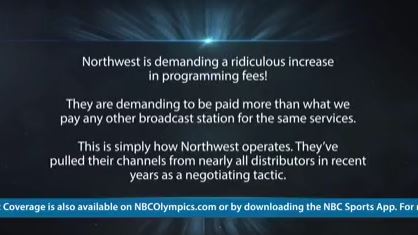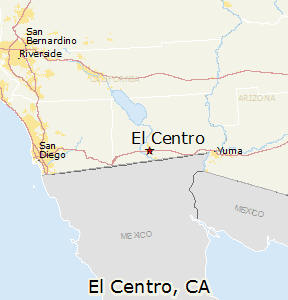 Charter Communications is taking the city of El Centro, Calif., to federal court for interfering in a dispute between Spectrum and a local TV station owner that has resulted in two stations being blacked out on the local cable system for nearly three months.
Charter Communications is taking the city of El Centro, Calif., to federal court for interfering in a dispute between Spectrum and a local TV station owner that has resulted in two stations being blacked out on the local cable system for nearly three months.
Northwest Broadcasting, Inc., has been in a contract extension dispute with Charter Communications over multiple stations, including its two El Centro-area affiliates KYMA (NBC) and KWST (CBS). Charter accuses Northwest of gouging, claiming “Northwest demanded an 80 percent increase in carriage fees, more than double the rate Charter pays any other broadcaster anywhere else in the entire country.”
On March 7, 2018, the City of El Centro got involved and cited the cable operator, alleging Charter violated five provisions of Article X of the City Code, and began fining the cable company $100 a day for each violation, assessed each day the dispute continues.
El Centro accuses Charter of:
- Discriminating against subscribers based on specific protected classes;
- Failure to notify the city and subscribers 30 days in advance of any changes to cable service or rates;
- Failure to establish a time frame to respond to service interruptions;
- Failure to refund customers for service interruptions exceeding a stated period;
- Failure to notify the city and subscribers 30 days in advance of any changes to the cable television channel lineup.
El Centro Mayor Sheryl Viegas Walker: “I’m taking it to the streets. I’m so fed up with [Spectrum’s] disregard for this community,” KYMA in El Centro reports. (3:02)
Northwest Broadcasting CEO Brian W. Brady strongly disputes Charter’s claims, dismissing them as “lies,” particularly surrounding the removal of two El Centro stations from Charter’s lineup after the cable company claimed Northwest refused permission to continue carrying the stations while renewal talks continued.
“Charter accepted the first two extensions which were offered to them, however, they refused the third extension and took our stations off with 10 minutes notice,” Brady said.
Charter’s lawsuit argues El Centro officials have no right to intervene in the dispute, force Spectrum to put the stations back on the lineup, or require Charter to issue refunds to customers for channels that are no longer available to them.
 “Northwest’s pulling its authorization for Charter to carry its broadcast signals is not a ‘service interruption’ within the meaning of the City Code provisions in question,” Charter argued in its lawsuit. “Even if it were, while El Centro demands that Charter ‘cure’ its alleged violations, the only means for Charter to do so is to finalize a retransmission agreement with Northwest. The City’s citations are thus intended to pressure Charter to accept Northwest’s unreasonable terms by imposing fines and intentionally damaging Charter’s reputation and harming its goodwill and relationships with its existing and prospective customers.”
“Northwest’s pulling its authorization for Charter to carry its broadcast signals is not a ‘service interruption’ within the meaning of the City Code provisions in question,” Charter argued in its lawsuit. “Even if it were, while El Centro demands that Charter ‘cure’ its alleged violations, the only means for Charter to do so is to finalize a retransmission agreement with Northwest. The City’s citations are thus intended to pressure Charter to accept Northwest’s unreasonable terms by imposing fines and intentionally damaging Charter’s reputation and harming its goodwill and relationships with its existing and prospective customers.”
Charter argued giving refunds to customers over the lost channels was “contrary to Charter’s terms of service, and in so doing improperly interfere [sic] with Charter’s contractual relationship with its customers.”
Charter is relying heavily on California’s statewide video franchise law — the 2006 Digital Infrastructure and Video Competition Act (DIVCA), heavily pushed by telecom lobbyists a decade ago, which stripped most local authority over cable systems and transferred it to the state government. Charter is using DIVCA’s light touch regulations to support its assertion El Centro officials cannot interfere in programming disputes and that their actions during the dispute have only made things worse.
“The effect of the City’s actions has been to harden Northwest’s negotiating position and make a deal on reasonable terms even more difficult,” the complaint says.
“I have never seen a corporate entity act with such disregard for our community,” said El Centro Mayor Sheryl Viegas Walker. “We have a contract with them that spells out certain steps that they’re required to take if those kinds of changes are going to be made. They didn’t do that. We wake up one morning and we’re suddenly without two major channels.”
 “Rather than negotiating in good faith like all other parties would do and what the law requires, Charter has taken a ‘take it or leave it’ approach,” added Brady. “In an effort this week to get this back on track, Northwest submitted a new proposal to Spectrum. Spectrum’s representative communicated that they really wanted to get this resolved, but would not counter Northwest’s proposal and would not respond at all in writing. Odd behavior for a company that claims to be negotiating in good faith. It appears that Charter would rather bully a small municipality than to engage in a good faith negotiation.”
“Rather than negotiating in good faith like all other parties would do and what the law requires, Charter has taken a ‘take it or leave it’ approach,” added Brady. “In an effort this week to get this back on track, Northwest submitted a new proposal to Spectrum. Spectrum’s representative communicated that they really wanted to get this resolved, but would not counter Northwest’s proposal and would not respond at all in writing. Odd behavior for a company that claims to be negotiating in good faith. It appears that Charter would rather bully a small municipality than to engage in a good faith negotiation.”
It appears other small cities are joining Brady’s cause, complaining to the Federal Communications Commission that Charter was unfairly profiting from station blackouts. In Crescent City, Calif., city officials accused Charter of charging a Broadcast TV surcharge of $7.50-8.85/month, but didn’t change or adjust rates after the Northwest Broadcasting blackout began.
 “Despite the fact the fee is itemized and justified as a pass-through, Charter did not eliminate or reduce that fee, even though it was no longer incurring costs associated with carriage of … at least two network affiliates,” Crescent City officials told the FCC.
“Despite the fact the fee is itemized and justified as a pass-through, Charter did not eliminate or reduce that fee, even though it was no longer incurring costs associated with carriage of … at least two network affiliates,” Crescent City officials told the FCC.
The two California cities have also been joined by officials in Yuma, Ariz. and Jackson, Wyo., where Charter has removed Northwest Broadcasting stations as well.
“We have learned that it is no different for numerous municipalities which have been forced to sue Charter to collect the fees that are contractually owed to them,” Brady said. “Most disputes are settled because Charter uses their army of lawyers to outspend the municipalities forcing the municipality to settle on Charter’s terms, regardless of their contractual obligations. It’s no different for their customers who have told us that Charter recently raised the broadcast surcharge fee in spite of the fact that the programs they want to watch are unavailable because Charter removed the programming. Many have asked for refunds only to be told no. What is the customer to do, sue Charter?”
Northwest Broadcasting Owned and/or Operated Television Stations
| City of license / Market | Station | Channel TV (RF) |
Owned since | Affiliation |
|---|---|---|---|---|
| Yuma, Arizona – El Centro, California | KYMA-DT | 11 (11) | 2014 | NBC |
| KSWT | 13 (13) | 2014 | CBS Estrella TV (DT3) |
|
| Eureka, California | KJRW | 17 (17) | 2016 | CBS |
| Pocatello – Idaho Falls, Idaho | KPVI-DT | 6 (23) | 2016 | NBC Decades (DT2) Movies! (DT3) |
| Greenville – Greenwood, Mississippi | WABG-TV | 6 (32) | 2016 | ABC Fox (DT2) |
| WFXW | 15 (15) | 2016 | Silent/Unused | |
| WNBD-LD | 33 (33) | 2016 | NBC | |
| WXVT-LD | 17 (17) | 2017 | CBS | |
| Binghamton, New York | WICZ-TV | 40 (8) | 1997 | Fox |
| WBPN-LP | 10 (40.2) | 2000 | MyNetworkTV | |
| Syracuse, New York | WSYT | 68 (19) | 2013 | Fox Cozi TV (DT2) |
| WNYS-TV | 43 (44) | 2013 | MyNetworkTV GetTV (DT2) |
|
| Medford, Oregon | KMVU-DT | 26 (26) | 1995 | Fox MeTV (DT2) |
| KMCW-LD | 14 | 2013 | Sonlife | |
| KFBI-LD | 48 (48) | 2013 | MyNetworkTV Telemundo (DT2) |
|
| Spokane, Washington | KAYU-TV | 28 (28) | 1995 | Fox Antenna TV (DT2) |
| Tri-Cities – Yakima, Washington | KFFX-TV | 11 (11) | 1999 | Fox Telemundo (DT2) |
| KCYU-LD (Semi-satellite of KFFX-TV) |
41 (41) | 1995 | Fox Telemundo (DT2) |
KPVI-TV in Pocatello, Ida. was widely seen in parts of Wyoming over Charter Communications until the station was blacked out in a contract dispute. Now viewers want to see Charter fined. (1:11)
Charter officials claim there was insufficient time to notify subscribers about the loss of Northwest Broadcasting stations from the TV lineup, but Jackson, Wyo., officials noted Charter bought a new domain name reflecting the contract dispute at least two weeks before stations like KPVI were blacked out. (1:02)
Jackson city officials question a Charter representative about refunds for customers paying surcharges for broadcast TV stations no longer on Charter’s lineup. (0:57)
How to File a Petition on this Issue with the Federal Communications Commission:
This petition allows for public comment until April 16, but the FCC requires some special steps for individuals wishing to file comment. Below is a list of the requirements to file a public comment with the FCC regarding Charter Communications:
- Members of the public who wish to comment should do so on or before April 16, 2018.
- Filing should be submitted to the FCC via the electronic comment filing system (ECFS).
- That system is accessible at https://www.fcc.gov/ecfs/filings.
- A member of the public should type his or her comments and save them.
- At the top of the ECFS page, select standard filing and in the “proceedings” box, type 18-91 (the proceeding is MB Docket No. 18-91).
- Fill out the remainder of the boxes with information that is required (some information is optional).
- At the end of the form, there is a box where saved comments can be uploaded.
- Comments that contain statements of fact (for example, “Here is what happened to me”) should be supported by an affidavit.
- “Comments or oppositions shall be served on the petitioner and on all persons listed in petitioner’s certificate of service…” The petitioners here are the Cities, and the certificate of service is at the end of the communities’ filing, which can be downloaded from https://www.fcc.gov/ecfs/filing/1032236683943.


 Subscribe
Subscribe
“harming its goodwill and relationships with its existing and prospective customers.”” LOL! “Goodwill” Ha!